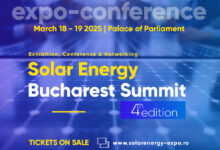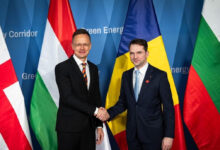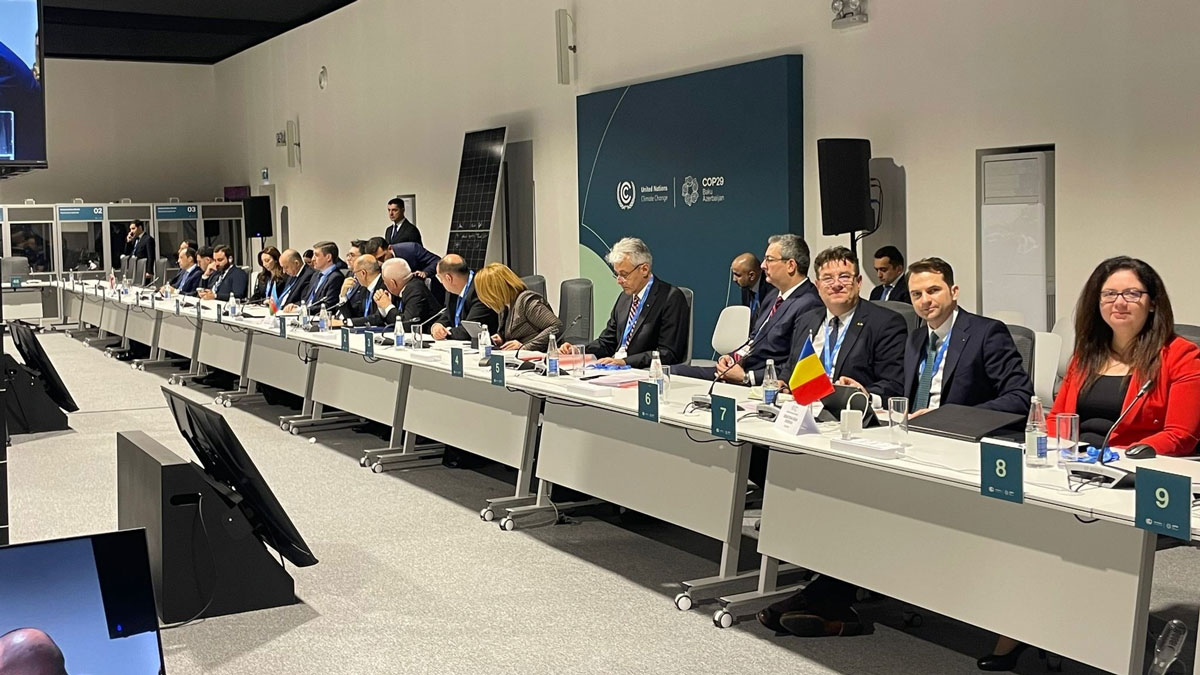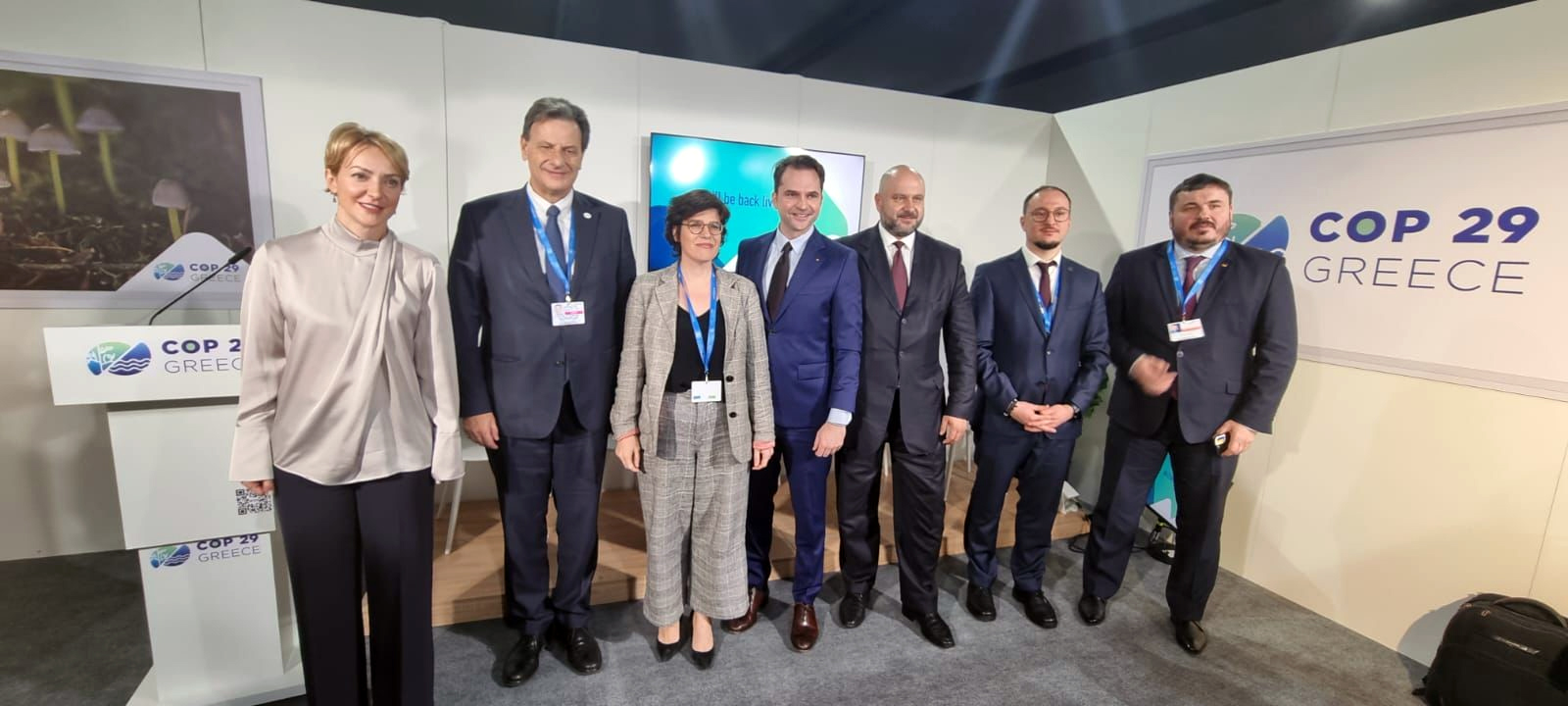Romania at COP29
In Solidarity for A Green World
Every year, the COP meets to determine ambitions and responsibilities for climate action, and to identify and assess climate measures. In 2024, Azerbaijan has been selected as the Presidency of the 29th Conference of the Parties (COP29), to be hosted in Baku. The presidency’s plan is based on two pillars: enhancing ambition, to ensure all parties commit to ambitious national plans; enabling action, which highlights the crucial role of finance in transforming ambition into tangible actions, reducing emissions, adapting to climate change and addressing loss and damage.
From 11 to 22 November, COP29 is bringing together the parties to the UN Framework Convention on Climate Change (UNFCCC). These include the EU and all EU member states.
The European Council called for an ambitious and balanced COP29 outcome that:
- Keeps the 1.5°C temperature goal within reach, considering the best available science moves us all forward towards long-term resilience
- Includes agreement on an effective, achievable and ambitious new collective quantified goal.
The Council underlined that the next round of national climate plans to be submitted in 2025 need to:
- Reflect progress and the highest possible level of ambition
- Include economy-wide and absolute reduction targets that cover all greenhouse gases.
In its conclusions, the Council also: highlighted the importance of urgently scaling up ambition and implementation with regard to mitigation; called on all parties to make greater efforts to integrate and mainstream climate change adaptation and resilience into relevant existing policies; reiterated the call to transition away from fossil fuels in energy systems in a just, orderly and equitable manner and to contribute to global efforts to accelerate zero-and low-emission technologies, in line with the decision of the first Global Stocktake agreed at COP28.
Critical issues in Romania
COP29 brings to the fore critical issues in Romania on climate goals, energy security and sustainable economic development. Romania is involved in various initiatives aimed at increasing renewable and nuclear energy production capacities, as well as carbon management and the implementation of carbon capture and storage technologies. COP29 also discusses regional cooperation initiatives aimed at improving energy interconnectivity between the Caspian Sea region and South-East Europe, offering Romania new opportunities for collaboration and strengthening energy security.
According to Minister of Energy Sebastian-Ioan Burduja, the joint project company for the realization of the Green Corridor will be launched next month, with headquarters in Bucharest. The investment will connect the Caspian Sea to the European Union. Hungary, Romania, Georgia and Azerbaijan aim to turn the region into a pole of stability and energy security.
The Green Corridor will enable the integration of a substantial amount of clean energy via a high-voltage direct current submarine cable across the Black Sea, connecting the four countries.
Two months ago, in Bucharest, CNTEE Transelectrica, Georgian State Electrosystem, AzerEnerji and MVM Electrical Works signed the deeds of incorporation of the Romanian-based Green Energy Corridor Power Company (GECO). The company will build the actual high-voltage direct current submarine cable.
The project has a key role in strengthening national and regional energy security, increasing connectivity in the Black Sea basin, diversifying supply routes, harnessing the potential of renewable energy and increasing its share in the national energy mix, as well as reducing electricity prices for household consumers and Romanian companies.
“There is no energy transition without energy transmission infrastructure. There is a profound lack of interconnection, the European energy market being decoupled. This is why we pay much higher prices in Eastern Europe than in Western Europe. The Green Corridor and the East-West Direct Current Interconnector are vital projects for Romania. Without these interconnections, we will not be able to evacuate additional energy from reactors 3 and 4 at Cernavoda and from the wind power plants in the Black Sea in the 2031-2032-time horizon. Moreover, a HVDC interconnection will be an extra lever at the National Energy Dispatch (DEN)’s disposal to balance the system. Establishing the headquarters of the Green Corridor project company in Bucharest has been a major diplomatic victory in recent months. Billions of euros will flow through the Romanian economy and the investment will mean jobs, growth and lower bills for Romanians. It is essential to rapidly develop new energy supply and transmission routes, not only to strengthen energy security, but also to increase market competitiveness through lower electricity prices,” Sebastian-Ioan Burduja said.
The main expectation from COP29 is to agree on a new, fair and ambitious collective quantitative target on climate finance. The COP29 presidency launched 14 initiatives linking climate action and sustainable development goals, including green energy corridors, energy storage, clean hydrogen, reducing methane in organic waste, green digital technologies and others.
Natural gas indispensable as transitional fuel
Minister of Energy Sebastian-Ioan Burduja, together with Theodoros Skylakakis, Minister of Environment and Energy of Greece and Vladimir Malinov, Minister of Energy of Bulgaria, participated as guest of honor at COP29 in a high-level event on the Vertical Gas Corridor with the participation of Kyriakos Mitsotakis, Prime Minister of the Hellenic Republic, Rumen Georgiev Radev, President of Bulgaria, and Victor Parlicov, Minister of Energy of the Republic of Moldova.
The dignitaries agreed that natural gas remains indispensable as a transitional fuel. To ensure Europe’s security of supply and competitive energy prices, urgent diversification of import sources is crucial. The Vertical Corridor plays a pivotal role in this process, especially as the agreement on Russian gas transit through Ukraine expires at the end of the year.
Romania is currently the largest gas producer in the European Union. Once Neptun Deep comes on stream, Romania’s gas production will double.
The Vertical Corridor, together with BRUA and the other infrastructure and interconnection projects, positions Romania not only as a major gas producer, but also as a gas transmission hub to Europe. Higher volumes, from different sources, lead to lower gas prices and market efficiency. Moreover, this route significantly strengthens the energy security of Ukraine and Republic of Moldova.
“The Vertical Gas Corridor is a symbol of good cooperation and our commitment to regional energy security. More gas means lower prices and greater security for consumers. It is also a regional initiative in which Romania, through Transgaz and the Ministry of Energy, has taken a leading role,” Sebastian-Ioan Burduja pointed out.
The Romanian Minister of Energy also supported a joint position paper on strengthening energy cooperation and interconnections in Europe.
“No country can manage the energy trilemma by itself: safe, cheap and clean energy. Europe has to work together. The lack of interconnection infrastructure between some countries in Central and Western Europe is not a bilateral problem, but a European one, a fundamental one. We disagree with the fact that some do what they want, and others do the right thing. Romania is interconnected with neighbouring countries at a level of 38% of actual production capacity, well above the European target of 15%. Other transit states in central Europe are unable or unwilling to connect with their neighbours. Romania will not remain silent in the face of this reality, in which the European energy market is no longer single, but decoupled and deeply unfair. How can our companies compete when prices on the energy exchange are 3-5 times higher than in Western Europe? How can we talk about European solidarity and competitiveness? Romania supports three solutions, which we have also presented in the Council of Energy Ministers: (1) analysing the existing interconnection capacities and their degree of utilization; (2) coordinating at European level the maintenance works of the interconnection lines; (3) accelerating the development plans of cross-border energy infrastructure, based on a timetable agreed at European level,” the Romanian Minister of Energy added.
At the same time, he reiterated Romania’s firm commitment to ensure Republic of Moldova’s energy security and support Ukraine.









